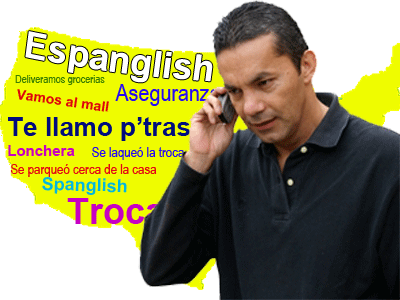
Speaking proper Spanish is valued by many people, especially those in business, government and education. Speaking casually with friends and family, language is fluid and is influenced by many things. Everyday language doesn’t need to obey all the rules. Most Spanish speaking people in the U.S. live in between proper Spanish and proper English and the need to communicate and be understood wins over the need to be dictionary-correct.
The emergence of Espanglish – Spanish with English-like words – has reached the point that the term has now been recognized by the oldest and most official source of Spanish in the world. ‘Espanglish’ was recently added in the dictionary of the Royal Academy of Spain.
“It is the first time that the Royal Academy of Spain recognized the word,” says Leticia Molinero, Academica Numeraria for the Academia Norteamericana de la Lengua Española (ANLE). Molinero is one of the top authorities of Spanish in the U.S. ANLE has an agreement with the U.S. government for consulting about proper Spanish and its use by government agencies.
It was ANLE that submitted ‘Espanglish’ for inclusion to the dictionary of RAE.
“The definition they published now is not exactly what we submitted – it contains some terms we are protesting,” says Molinero. RAE´s definition is as follows:
“A form of speech used by some Hispanic groups in the United States, in which they mix deformed elements of vocabulary and grammar from both Spanish and English.”
The family of Melissa Becerra of San Leandro represents every common usage of Spanish and English among Hispanics. Melissa, 14, speaks Espanglish only with her father.
“My Dad always talks to me in Espanglish and my Mom wants {proper} Spanish,” she says. “If my Mom talks to me in Spanish, I will talk back in Spanish, and if she speaks English I will talk back in English.
Melissa offers examples of the few times that she does speak Espanglish with her mother:
“I usually say, ‘Mom can I go with my friends? Vamos a ir a la mall (centro comercial)’ or ‘Voy a ir con my friends y vamos a hacer the projects’.”
“When my friends communicate to me in Spanish, they say everything in Spanish, not Espanglish,” adds Melissa.
Maintained and updated for centuries, the dictionary of RAE contains all the Spanish words that exist, including the ‘ismos’ from every Spanish speaking community in the world (e.g. mexicanismos, argentinismos, and now estadounidismo).
An ‘estadounidismo’ is a word that does not exist in Spanish but is used when speaking or writing Spanish in the U.S. Molinero says that an example arose when the financial crisis started in 2008 and the word ‘trillions’ was being used often in news reporting. Since the Spanish translation of ´trillion´ is ´billion´, it was decided by experts like Molinero that ´trillones´ would be used in Spanish.
The official recognition of Espanglish, however, does not mean that it is recognized as a language, only as a popular use of Spanish.
“It is a natural phenomenon that we don’t want to try to control or contain,” says Molinero, who also points out that the Spanglish in L.A. may be different than it is in Miami or Boston, for example.
“Sometimes it is easier to create a new word in Spanish or people want to come closer to English - it is spontaneous and happens in many countries in different languages.”
“It is our right to say these words in this country in a certain way, concludes Molinero. “Every country does it.”
